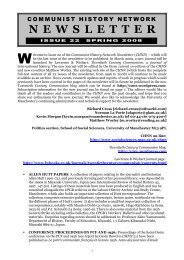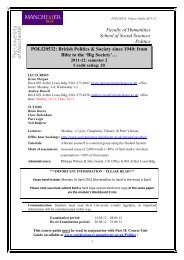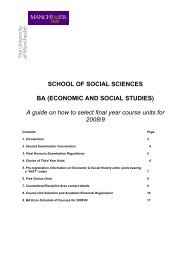second year course outlines 2012-2013 - School of Social Sciences ...
second year course outlines 2012-2013 - School of Social Sciences ...
second year course outlines 2012-2013 - School of Social Sciences ...
You also want an ePaper? Increase the reach of your titles
YUMPU automatically turns print PDFs into web optimized ePapers that Google loves.
experience? Some have argued that our experience <strong>of</strong> the present is itself temporally<br />
extended<br />
(the so-called specious present view, held by William James), others that our perception <strong>of</strong><br />
the<br />
present moment is accompanied by an imaginative awareness <strong>of</strong> the recent past (Brentano).<br />
Husserl argues for the existence <strong>of</strong> a primitive sort <strong>of</strong> memory (retention) which permeates<br />
all<br />
perceptual awareness <strong>of</strong> temporally extended objects (events).<br />
Husserl’s view might be criticised in a number <strong>of</strong> ways, two <strong>of</strong> which would be: (i) the worry<br />
that the<br />
retention-primal impression-protention structure that he attributes to all experience cannot<br />
really<br />
explain the phenomenon <strong>of</strong> experienced duration, and (ii) the concern that retention does not<br />
really<br />
differ in any significant way from recollection.<br />
The Reading<br />
‘The Phenomenology <strong>of</strong> Internal Time Consciousness’ is, at times, a difficult read. It is,<br />
however,<br />
recognised as an important contribution to the perplexing topic <strong>of</strong> our awareness <strong>of</strong> the<br />
passing <strong>of</strong><br />
time. Husserl spends a good deal <strong>of</strong> time describing retention (and to a lesser extent,<br />
protention),<br />
and distinguishing it from another type <strong>of</strong> memory, recollection. The reading also includes a<br />
difficult<br />
but important discussion <strong>of</strong> the duration <strong>of</strong> experience itself (§18).<br />
Questions to Consider:<br />
1. What do you think the phenomenon is that Husserl is attempting to characterise?<br />
2. For much <strong>of</strong> this reading Husserl is concerned to distinguish between what he calls<br />
primary<br />
memory (retention) and <strong>second</strong>ary remembering (recollection). What is the difference<br />
between the two? Do you think that Husserl has made a good case for his view that they<br />
are different in kind?<br />
3. In §§16-17 Husserl distinguishes between two senses <strong>of</strong> ‘perception’. What does this<br />
distinction amount to?<br />
4. Husserl doesn’t say very much about it, but what is protention (expectational intuition)?<br />
16<br />
Lecture 5 (Week 5): Perception I – the objects <strong>of</strong> perception (Heidegger)<br />
Required Reading:<br />
Heidegger, M. 1925. The Fundamental Discoveries <strong>of</strong> Phenomenology, its Principle, and<br />
the<br />
Clarification <strong>of</strong> its Name (§5). In Moran, D. & Mooney, T. The Phenomenology Reader.<br />
London: Routledge, 2002. [S]<br />
Recommended Reading:<br />
Crane, T. 2006. Is there a perceptual relation. In Gendler, T. & Hawthorne, J. Eds.<br />
Perceptual<br />
Experience. Oxford: Oxford University Press.<br />
Also available at www.timcrane.com<br />
Further Reading:<br />
Carman, T. 2003. Heidegger’s Analytic: Interpretation, Dis<strong>course</strong> and Authenticity in Being<br />
and<br />
Time. Cambridge: Cambridge University Press, Chs.3-4.<br />
Christensen, C. B. 1997. Heidegger’s Representationalism. Review <strong>of</strong> Metaphysis 51 [O]<br />
*Hopp, W. 2008. Husserl on sensation, perception and interpretation. Candadian Journal<br />
<strong>of</strong><br />
51

















